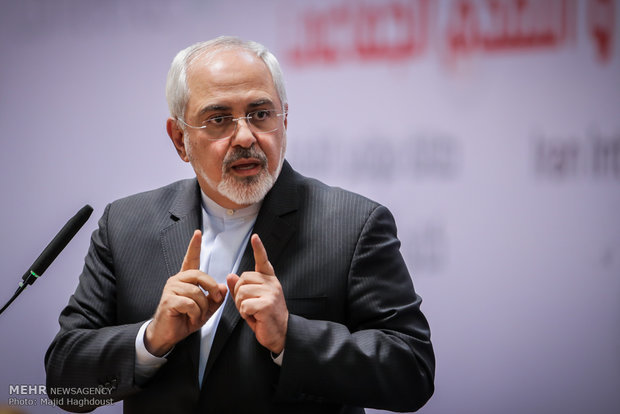Zarif: Trump, MBS, Netanyahu ‘are symbols of mistrust, violence, suppression’

TEHRAN – Foreign Minister Mohammad Javad Zarif said on Monday that those who violate international agreements, easily infringe on the rights of the Palestinian people, and take the prime minister of another country hostage are the symbols of “mistrust, violence and suppression” in the world.
Zarif made the remarks in reference to U.S. President Donald Trump who withdrew from the international 2015 nuclear agreement, Israeli Prime Minister Benjamin Netanyahu who is continuing to steal the Palestinian lands and Saudi Crown Prince Mohammad bin Salman (MBS) whose country took Lebanese Prime Minister Saad Hariri as hostage in order to create insecurity in Lebanon.
The chief diplomat also said Trump and his Middle East allies have become isolated in their hostility toward Tehran.
“Talk to anyone, anywhere in the world and they will tell you that Netanyahu, Trump and bin Salman are isolated, not Iran,” he said, adding that the world has distanced itself from the anti-Iran policies of the U.S., Saudi Arabia and Israel.
The remarks come as the first round of U.S. sanctions against Iran, lifted under the 2015 nuclear agreement, are due to go into effect on Tuesday, targeting Iran’s purchases of dollars, its trade in gold and precious metals and its automotive sector.
Back in May, in a unilateral move widely criticized by the international community, Trump withdrew from the nuclear pact, also known as the Joint Comprehensive Plan of Action (JCPOA). The decision, however, was welcomed by Israel and Saudi Arabia.
While acknowledging the impact of U.S. pressure on Iran, Zarif said, “Our current status is the effect of their psychological warfare against our nation, but nothing else will happen because they did everything they could.”
Foreign Minister says it was hard to imagine negotiation with Trump after he tried to kill the JCPOA, on which Iran, the European Union, five permanent members of the UN Security Council and Germany had spent the “longest hours in negotiating history”.
“We will overcome this period of hardship as well,” he remarked.
The foreign minister also suggested it was hard to imagine negotiation with Trump after he tried to kill the JCPOA, on which Iran and the European Union, five permanent members of the UN Security Council plus Germany had spent the “longest hours in negotiating history”.
“Despite all this, you claim to be open to negotiations?” Zarif asked Trump, a week after the U.S. president called for talks with President Hassan Rouhani without preconditions.
“It’s good for the country, good for them, good for us and good for the world. No preconditions. If they want to meet, I’ll meet,” Trump said.
“Who believes that Trump wants to negotiate with Iran?” Zarif asked.
MH/PA
